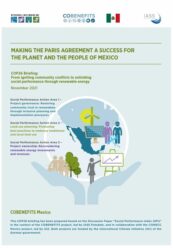 In an explorative study conducted by IASS Potsdam in the context of the COBENEFITS project in 2020, a Social Performance Index (SPI) was developed with stakeholders of communities who had been positively or negatively impacted by renewable energy projects. The study centred on two questions:
In an explorative study conducted by IASS Potsdam in the context of the COBENEFITS project in 2020, a Social Performance Index (SPI) was developed with stakeholders of communities who had been positively or negatively impacted by renewable energy projects. The study centred on two questions:
- How does a renewable energy project perform socially, i.e., how does it contribute to the well-being of individuals and local host communities?
- How can the social performance of renewable energy projects to improve and sustain the well-being of individuals and local host communities be ensured and enhanced?
This case study builds on insights from consultative interviews with renewable energy experts, activists, community leaders, representatives of non-governmental organizations, and public officials from the environmental sector in Mexico. The interviews shed light on diverging perspectives and experiences with renewable energy projects in Mexico regarding their social performance for local communities. The interviews explored the different notions and understandings of what social performance means for communities in Mexico as well as the perceived status quo and the prospects of renewable energy projects performing for society.
COP26 Briefing Mexico [PDF]
October 2021
This COP26 briefing has been prepared based on the Discussion Paper “Social Performance Index (SPI)” in the context of the COBENEFITS project, led by IASS Potsdam, and in collaboration with the CONECC Mexico project, led by GIZ. Both projects are funded by the International Climate Initiative (IKI) of the German government.